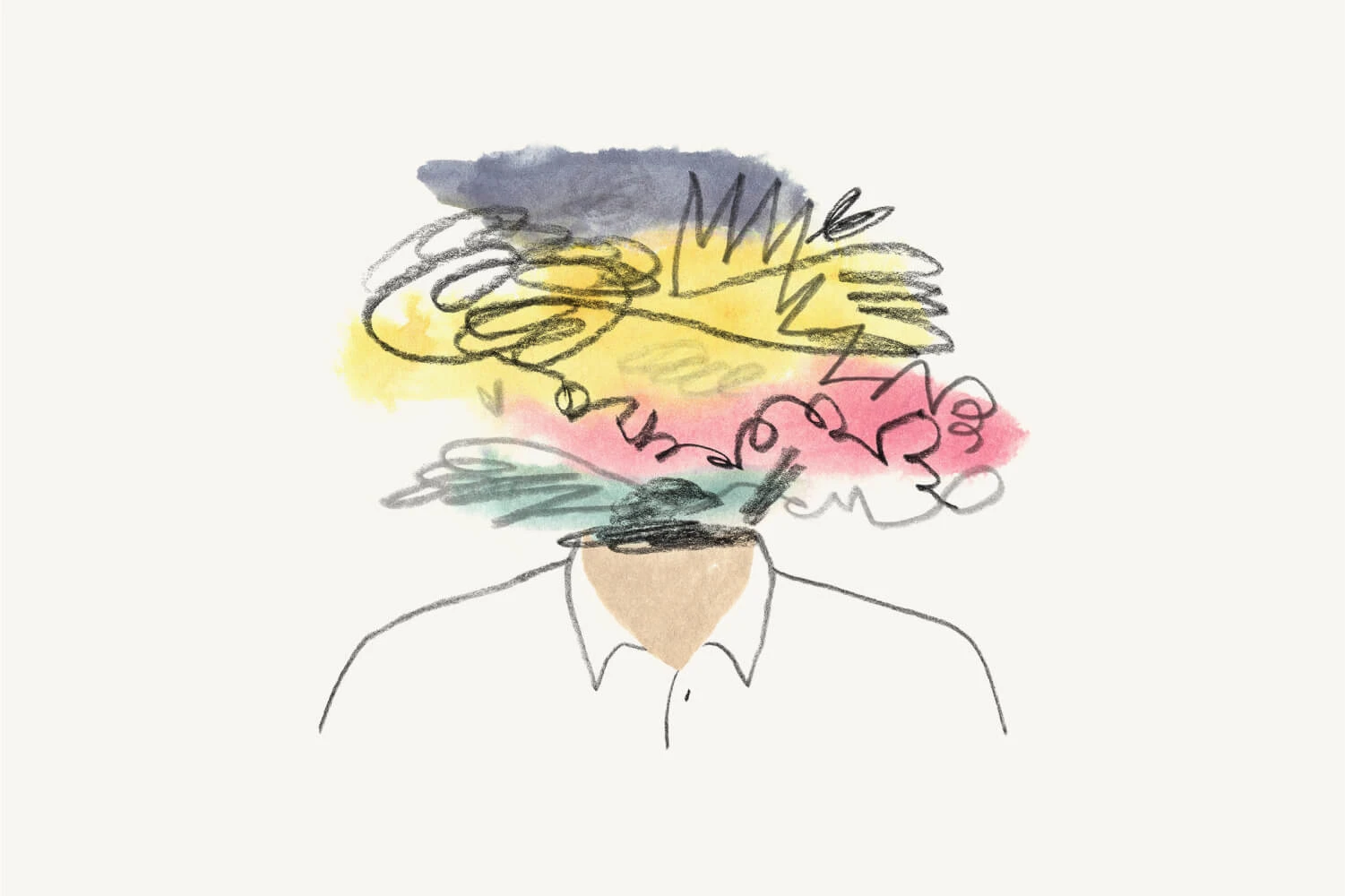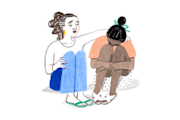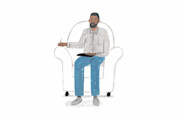Explore anxiety disorders topics
Anxiety Disorders
Anxiety disorders—including generalized anxiety disorder (GAD), phobias, social anxiety, and panic disorder—are the most common mental health concern in the U.S.
Over 40 million people, 19% of American adults, have an anxiety disorder.
According to Harvard Medical School’s National Comorbidity Study, one in three Americans (31%) will experience an anxiety disorder over their lifetimes.
That’s 102 million of us!
So, if you're wondering how to tell the difference between stress and anxiety or whether you might have the signs of high-functioning anxiety—you've arrived in the right place.
The good news is that anxiety disorders are very treatable. More on this below.

1. What are anxiety disorders?
Feeling nervous or anxious from time to time happens to pretty much everyone. It’s part of being human.
Typically, in a normal case of stress, when the event or concern that triggered our concern ceases or ends, our anxiety symptoms subside.
In contrast, here's how to recognize an anxiety disorder, and the difference between anxiety and stress.
Anxiety disorders are not just a case of ‘nerves.’
According to Mental Health America (MHA), these disorders cause us to feel anxious most of the time, making some everyday situations so uncomfortable that we may avoid them entirely.
For those living with anxiety disorders, we can experience “persistent, excessive fear or worry in situations that are not threatening.”
Emotional anxiety symptoms can also include feelings of apprehension or dread and/or anticipating the worst and being watchful for signs of danger.
When symptoms from anxiety disorder are left unaddressed and untreated, they can be detrimental to our cardiovascular, digestive, immune, and nervous systems.
2. Generalized anxiety disorder (GAD)
People with generalized anxiety disorder (GAD) may stress about impending disaster and may be overly worried about money, health, family, work, or other issues, according to the Anxiety & Depression Association of America (ADAA).
8 signs of GAD:
Nervousness, irritability, or feeling on edge
A sense of impending danger, panic or doom
An increased heart rate
Breathing rapidly (hyperventilation), sweating, and/or trembling
Feeling weak or tired
Difficulty concentrating
Trouble sleeping
Gastrointestinal (GI) problems
If you experience one or more symptoms, consider speaking with your primary care doctor or a mental health professional, such as a licensed therapist who specializes in anxiety.
3. Panic disorder
Individuals with panic disorder experience panic attacks and sudden feelings of terror sometimes occurring repeatedly and without warning.
According to the American Psychological Association (APA) Diagnostic and Statistical Manual, fifth edition (DSM-5)—the handbook healthcare professionals use to diagnose mental disorders—a panic attack as “an abrupt surge of intense fear or intense discomfort that will come to a sort of terrifying crescendo within a window of approximately ten minutes.”
A panic attack causes powerful physical symptoms including chest pain, heart palpitations, dizziness, shortness of breath and stomach upset. See all 13 symptoms of a panic attack.
Here's how to find a therapist who specializes in treating panic disorders.
4. Post-traumatic stress disorder (PTSD)
Post-traumatic stress disorder (PTSD) is a psychological reaction to an extremely stressful event (aka trauma) outside the range of everyday experience, such as fighting in a war, physical violence, or a natural disaster.
Traumatic events are often life-threatening, catastrophic and outside the realm of day-to-day life, but not always.
More common issues like domestic violence, emotional abuse, codependency and intense emotional upheaval can all lead to PTSD.
The symptoms may include depression, anxiety, flashbacks, recurrent nightmares, and avoidance of situations that might trigger memories of the event.
Concerned you may have PTSD? See five surprising symptoms of trauma. And answer a few questions in our online PTSD assessment to get personalized feedback.
Though there’s no single “cure” for PTSD, the good news is it can be successfully treated, with some symptoms improving relatively quickly.
PTSD treatment can include several different therapeutic methods such as cognitive behavioral therapy (CBT), mindfulness therapy (MBT), and eye movement desensitization and reprocessing therapy (EMDR).
Talking with a therapist, psychologist, or counselor can help you recover.
On the Monarch Directory by SimplePractice you can see therapists who specialize in clients with PTSD.

5. Obsessive-compulsive disorder (OCD)
Obsessive-compulsive disorder (OCD) affects around 1-3% of the population.
OCD is characterized by unwanted, intrusive, persistent or repetitive thoughts, feelings, ideas, sensations (obsessions), or behaviors that makes the sufferer feel driven to do something (compulsions) to get rid of the obsessive thoughts.
This only provides temporary relief and not performing the obsessive rituals can cause great anxiety.
A person’s level of OCD can be anywhere from mild-to-severe.
However, if OCD symptoms are severe and left untreated, the disorder can negatively impact or damage a person’s capacity to function at work, at school, or even at home.
Thankfully, there are OCD treatments that get results.
Here's how to find a therapist near you who treats OCD.
6. Social anxiety disorder
More than shyness, social anxiety disorder causes intense fear about social interaction, often driven by irrational fear such as worrying that you might say or do something embarrassing or humiliating.
Those of us with social anxiety disorder may not take part in conversations, contribute to class discussions or offer their ideas, and may become isolated.
Symptoms of social anxiety disorder may include:
Finding it difficult to make eye contact, be around people we don’t know, or talk to people in social situations
Self-consciousness or fear that people will judge them negatively
Blushing, sweating, or trembling
A rapid heart rate
Our “minds going blank”
Feeling sick to your stomachs
A rigid body posture
Speaking with an overly soft voice
Avoiding places where there are other people.
Find therapists who specialize in helping people with social anxiety.
7. Phobias
We all tend to avoid certain things or situations that make us uncomfortable or even fearful.
However, for those of us with a phobia, certain places, events or objects create intense reactions of fear.
Phobias produce intense fear of a particular object or situation that is, in fact, relatively safe, according to Mental Health America (MHA). “People who suffer from specific phobias are aware that their fear is irrational, but the thought of facing the object or situation often brings on a panic attack or severe anxiety.”
To avoid panic, they may take a number of steps to avoid their triggers.
Depending on the type and number of triggers, attempts to control fear from phobias can take over a person’s life.
Treatment can help. See therapists near you who specialize in phobias.
8. When is anxiety a problem?
When the cognitive, physical, and behavioral symptoms of anxiety are persistent and severe, and anxiety causes extreme distress in our lives the extent that it negatively affects our ability to manage day-to-day tasks, it may be beyond normal range.
The following examples of anxiety symptoms may indicate an anxiety disorder:
| Symtoms | |
|---|---|
| Cognitive | Anxious thoughts such as “I’m losing control.” Worries such as “I’m going to fall flat on my face and make a fool out of myself.” Limiting beliefs such as “only weak people get anxiety.” |
| Physical | Excessive physical reactions relative to the situation (i.e., heart palpitations and shortness of breath in response to being in Home Depot. The physical symptoms of anxiety may be mistaken for symptoms of a physical illness, such as a heart attack. |
| Behavioral | Avoidance of feared situations such as driving, avoidance of activities that elicit sensations similar to those experienced when anxious, subtle avoidances (behaviors that aim to distract the person, e.g., excessive talking during periods of anxiety) and safety behaviors (habits to reduce anxiety and feel “safer,” e.g., always having a cell phone available in case you need to call for help). |
9. Take our online anxiety assessment
To help determine whether you may have symptoms of an anxiety disorder, take our 2-minute online anxiety assessment.
If you suspect you might be living with an anxiety disorder, be sure to talk with your primary care physician and/or a licensed therapist nearby about your concerns.
10. How to get help with anxiety disorders
Doctors or licensed mental health professionals, such as therapists, can help.
Here’s how to find licensed therapists who specialize in anxiety, including those who help clients with social anxiety.
On the Monarch Directory by SimplePractice you can also see therapists who specialize in clients with PTSD, and mental health professionals who treat OCD, as well as clinicians who treat panic disorders and phobias.
The Monarch Directory makes it easy to find therapists and counselors who offer teletherapy through SimplePractice’s fully-secure and HIPAA-compliant telehealth platform.
You can find therapists who accept your insurance, and book a telehealth video counseling session, an in-person therapy session, or a free 15-minute initial consultation.
Related articles about anxiety disorders

No one had a perfect childhood. That goes without saying. But what counts as trauma?

Panic attacks are not fatal—but they can feel like they are. Here, 7 people describe what panic attacks feel like to them.

No question, breaking up is hard. And while the only real cure for a breakup is time, it’s helpful to understand the science behind heartbreak.

How long will you have to be in therapy? What are the factors that determine how long you’ll be on the couch?